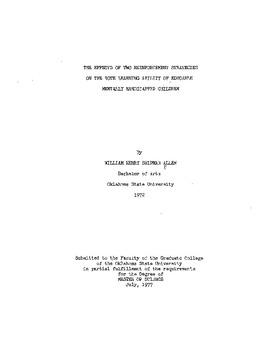| dc.contributor.advisor | Elsom, Bill F. | |
| dc.contributor.author | Allen, William Henry Shipman | |
| dc.date.accessioned | 2015-09-29T15:29:03Z | |
| dc.date.available | 2015-09-29T15:29:03Z | |
| dc.date.issued | 1977-07-01 | |
| dc.identifier.uri | https://hdl.handle.net/11244/18990 | |
| dc.description.abstract | This study is concerned with a comparison of the effects of nontangible reinforcement strategies, i. e. verbal praise verses self monitoring of performance, and their cumulative ef~ect on the rote learning ability of educable mentally handicapped children. The primary objective is to explore new methods (non-tangible reinforcers) for reinforcing and motivating mentally handicapped children to perform better academically which do not rely strictly on tangible reinforcers and external control agents. Because of my decision to work with educable mentally handicapped children, this study was quite difficult to organize and run. Students had to be randomly selected from many special education classrooms in a number of school districts. Problems were manifest in scheduling, selection of examiners, cooperation from school districts, and the financial cost of running this study. | |
| dc.format | application/pdf | |
| dc.language | en_US | |
| dc.publisher | Oklahoma State University | |
| dc.rights | Copyright is held by the author who has granted the Oklahoma State University Library the non-exclusive right to share this material in its institutional repository. Contact Digital Library Services at lib-dls@okstate.edu or 405-744-9161 for the permission policy on the use, reproduction or distribution of this material. | |
| dc.title | Effects of Two Reinforcement Strategies on the Rote Learning Ability of Educable Mentally Handicapped Children | |
| dc.type | text | |
| dc.contributor.committeeMember | Pearl, Joseph | |
| dc.contributor.committeeMember | Warden, Paul G. | |
| osu.filename | Thesis-1977-A432e.pdf | |
| osu.accesstype | Open Access | |
| dc.description.department | Educational Psychology | |
| dc.type.genre | Thesis | |
